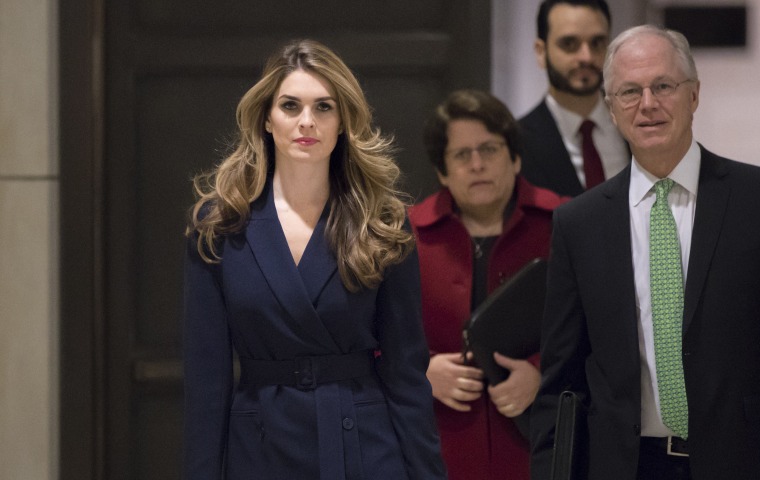WASHINGTON — This week's surprise departure of White House communications director Hope Hicks struck at the heart of President Donald Trump’s diminishing inner circle and fueled public perception of an administration seemingly incapable of stability.
But on Thursday, the White House opted to say nothing at all about Hicks’ imminent exit or about who might be tapped to become the president's fifth communications director.
Behind the scenes, sources suggest that morale is waning at the White House. Two people close to the administration tell NBC News that the president is angry and depressed after losing Hicks, whom he had looked upon as one of his own children.
A third source familiar with the matter said the president and Hicks shared a “misty” goodbye after her resignation on Wednesday.
Hicks, 29, has been a longtime member of the Trump family's inner circle, having served as press secretary for his presidential campaign before being tapped to join the White House staff. Hicks, a former Ralph Lauren model, previously worked for the Trump Organization and for Ivanka Trump's fashion brand.
She assumed the role of communications director last summer after an eventful 11-day tenure by Anthony Scaramucci.
White House press secretary Sarah Huckabee Sanders dismissed questions about Hicks’ departure or on any potential replacements at the daily briefing Thursday, saying she had no personnel announcements to make.
Hicks’ resignation ended a chaotic month, even by the standards of an administration that has struggled to maintain even a semblance of balance or cohesion.
Earlier in February, the administration was rocked by a scandal involving White House staff secretary Rob Porter, a senior official and rising Washington star who was accused by his two ex-wives of verbal and physical abuse.
The controversy cascaded into questions about how classified intelligence is handled within the White House, leading to new internal guidelines. It also brought increased scrutiny on chief of staff John Kelly after contradictory public and private accounts emerged on how he responded to the accusations against Porter.
Hicks’ resignation came a day after she appeared before the House Intelligence Committee, which is investigating Russian interference in the 2016 election. During her testimony, Hicks acknowledged that she had sometimes told "white lies" for the president, according to lawmakers.
An important witness to campaign and White House matters that are potentially relevant to the ongoing government probes into Russian meddling, Hicks declined to answer questions about her time in Trump's administration, citing advice from the White House.
Hicks also declined to answer most questions about the transition period between the election and the inauguration.
Most significantly, however, White House officials fear that Hicks’ departure will leave the president unmoored. Hicks and Trump’s former bodyguard, Keith Schiller, were among the closest nonfamily members to join the president at the White House. Schiller left the job last summer.
Two administration officials note that she was among the few people able to influence Trump on messaging, at times helping him craft tweets or, on occasion, even stopping him from sending posts that might do more harm than good — something even Kelly, a retired four-star general, has not managed to do.
"The people who are trying to protect the president from himself and his tweets have lost an ally with Hope's departure," one of the sources said.
